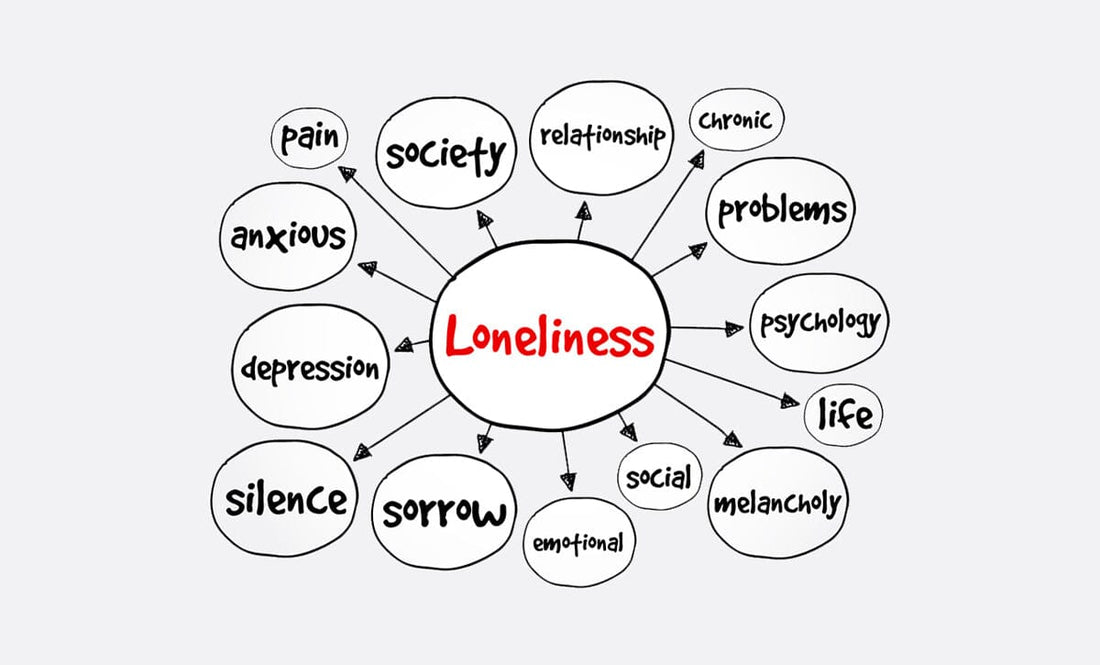Mental Health and Loneliness
An estimated 44 percent of U.S. adults are experiencing significant loneliness, according to data compiled in the Gallup National Health and Well-Being Index.1 Though this figure is lower than the loneliness reported at the height of the pandemic, it still indicates a mental health crisis in America, especially among young adults and those in low-income households.
Read on to explore the relationship between mental health and loneliness, the main causes of loneliness, and what you can do to connect more easily with others.
What is the Main Cause of Loneliness?
There are many reasons why a person can feel lonely — moving to a new town, dealing with a breakup, not having enough time to socialize, living in a remote place, etc. But one general reason why humans have become increasingly more lonely as a society is our shift from close-knit communal living to more private and isolated lifestyles. Fewer people engage in religious communities or civic organizations, many people now work remotely, and it’s not uncommon to communicate with loved ones through a digital screen instead of in person. As one researcher put it, we (Americans), are “50% human and 50% technology,” indicating that excessive screen time is a pervasive driver of loneliness.2
Different Types of Loneliness to Be Aware Of
Everyone gets lonely from time to time, but when this emotion becomes chronic, it can wreak havoc on your mental and physical health, increasing your risk of cardiovascular disease, dementia, stroke, depression, anxiety, and premature death.3 According to one 2021 study, there are three main types of loneliness:4
- Social: Lack of a strong social network or an engaging one
- Emotional: Craving intimate connection but not having someone to turn to
- Existential: Fear of disappearing from the earth or being forgotten; failure to find meaning in life
Social and emotional loneliness tend to occur as a result of reduced social activities or a loss of a partner. These types of loneliness are said to “happen” to people and are not voluntarily chosen. They can also be remedied by increasing one’s social engagement, expanding their community, and improving their attempts at connection.
Existential loneliness is a bit more complicated. It often impacts people with severe illness, elderly individuals who are socially isolated, or those with mental health issues like depression or anxiety that makes them feel separate from the world around them. Some people with this type of loneliness can feel lonely, even when they are around other people.
How Do You Deal with Chronic Loneliness?
Chronic loneliness requires thoughtful and sustained efforts to overcome. Exploring coping mechanisms is vital, encompassing both self-help strategies and support from mental health professionals. Proactive steps, such as joining social groups, engaging in hobbies, volunteering, or practicing mindfulness, can contribute to alleviating chronic loneliness and dealing with the fear and anxiety that may be preventing you from reaching out to those around you.
Other things you can do to combat loneliness:
- Talk to a therapist or counselor you trust.
- Examine your thoughts to identify limiting beliefs that may be holding you back from a more social and engaged life. Challenge these beliefs.
- Exercise regularly to boost your energy levels. You may even want to join a sports team or sign up for a class to meet new people.
- Be vulnerable. You may feel like the people in your life are too busy for you, but chances are they might not know you need support. Opening up and being vulnerable with others opens the door for them to be vulnerable with you. This is where true connection happens.
- Consider getting a pet. Whether it’s an official support animal or not, a pet can be a wonderful companion if you have the time and energy to care for them.
How Loneliness Can Impact Behaviors in Adult & Children
According to research in the American Psychological Association, individuals who are lonely may slide into unhealthy behaviors in order to cope with their feelings.5 Loneliness has been found to increase stress levels, disrupt sleep, contribute to overeating and substance abuse, and exacerbate depression and anxiety. It has also been shown to accelerate cognitive decline, leading to poor memory, brain fog, and fatigue.
If you feel that loneliness is causing stress and anxiety in your life or your child’s, consider taking a holistic approach and addressing whole-body health as a first step. Brillia’s Five Pillars consists of healthy habits like proper nutrition, adequate sleep, controlled screen time, and mindfulness, which are scientifically proven to reduce stress and anxiety for long-term support. Our resource center provides numerous strategies for improving your lifestyle through recipe ideas, sleep tips, screen time alternatives, and mindfulness practices so you can build the skills necessary to self-regulate with or without medication. And if you need more support, consider taking an over-the-counter medication like Brillia to help get you back on track.
Brillia is a non-prescription medication that is extremely targeted to regulate the neurotransmitters that provoke feelings like anxiousness, irritability, stress, and restlessness without harsh chemicals or harmful side effects. Its active ingredient, consisting of antibodies to the S100B protein, doesn’t mask your personality or your symptoms–rather, it reduces their intensity while promoting calmness and clarity so you can feel better equipped to handle life’s ups and downs.
Brillia’s efficacy is maximized when combined with the Five Pillars. This holistic approach allows you to make effective long-term changes to deal with loneliness head-on while feeling more focused and less stressed along the way.
The medication comes in two formulas: Brillia for Children & Teens for ages 5-18 and Brillia for Adults.
Learn more about how Brillia works and find more resources on how to cope with anxiety and stress at the Brillia(nce) Resource Center.
 A whole bunch of support right in your inbox.
A whole bunch of support right in your inbox.





